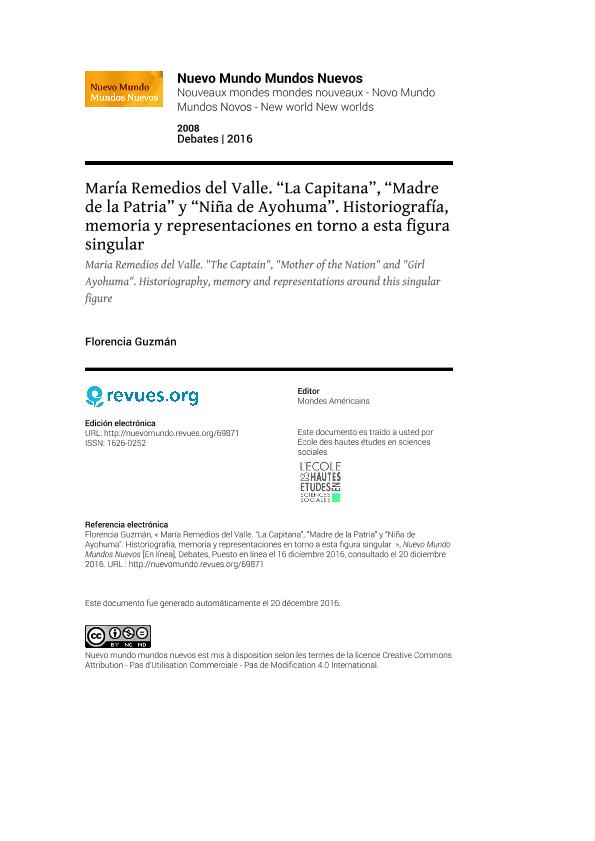Artículo
El día 8 de noviembre de 2013 ha sido establecido como el “día de los/las afroargentinos/as y de la Cultura Afro”, en memoria del fallecimiento de una luchadora de la Guerra de la Independencia, María Remedios del Valle, conocida como “La Capitana”, “Madre de la Patria” y “Niña de Ayohuma”. La significación de esta figura nos interpela a analizar su trayectoria como “Benemérita de la Patria”. Se trata, en primer lugar, de examinar cuáles fueron las diversas acciones realizadas por esta valiente mujer en las campañas militares revolucionarias que le habrían proveído de un lugar simbólico de respetabilidad y aceptabilidad. En segundo lugar,resulta prioritario reconstruir las miradas historiográficas referidas a esta trayectoria : cuándo y cómo María Remedios fue incorporada a la narrativa patriótica y cómo esta se fue resignificando a lo largo del tiempo. Por último, implica invariablemente explorar las representaciones vinculadas con María Remedios del Valle – textuales, icónicas y políticas – con la intención de continuar examinando los lugares que sucesivamente ocuparon en el imaginario nacional los hombres y las mujeres afrodescendientes. On November 8, 2013 has been set as the "day of the Afro-Argentine y of African culture" in memory of the death of a fighter of the War of Independence, Maria Remedios del Valle, known as "The Captain" "Mother of the Nation" and "Ayohuma Girl". The significance of this figure challenges us to analyze his career as a "Meritorious of the Patria". It is first to examine what were the various actions carried out by this brave woman in the revolutionary military campaigns that would have provided him a symbolic place of respectability and acceptability. Secondly, it is a priority to reconstruct the historiographical looks views regarding this trajectory: when and how Maria Remedios was incorporated into the patriotic narrative and how it was resignifying over time. Finally, it implies invariably explore the representations linked to María Remedios - textual, iconic and political-with the intention to continue examining the places successively occupied in the national imagination men and women of African descent. On November 8, 2013 has been set as the "day of the Afro-Argentine y of African culture" in memory of the death of a fighter of the War of Independence, Maria Remedios del Valle, known as "The Captain" "Mother of the Nation" and "Ayohuma Girl". The significance of this figure challenges us to analyze his career as a "Meritorious of the Patria". It is first to examine what were the various actions carried out by this brave woman in the revolutionary military campaigns that would have provided him a symbolic place of respectability and acceptability. Secondly, it is a priority to reconstruct the historiographical looks views regarding this trajectory: when and how Maria Remedios was incorporated into the patriotic narrative and how it was resignifying over time. Finally, it implies invariably explore the representations linked to María Remedios - textual, iconic and political-with the intention to continue examining the places successively occupied in the national imagination men and women of African descent.
María Remedios del Valle. La Capitana, Madre de la Patria y Niña de Ayohuma: Historiografía, memoria y representaciones en torno a esta figura singular
Título:
Maria Remedios del Valle. "The Captain", "Mother of the Nation" and "Girl Ayohuma". Historiography, memory and representations around this singular figure
Fecha de publicación:
12/2016
Editorial:
Mondes Américains
Revista:
Nuevo Mundo Mundos Nuevos
ISSN:
1626-0252
Idioma:
Español
Tipo de recurso:
Artículo publicado
Clasificación temática:
Resumen
Palabras clave:
Genero
,
Afrodescendiente
,
Reivindicacion
,
Representacines
Archivos asociados
Licencia
Identificadores
Colecciones
Articulos(INSTITUTO "DR. E.RAVIGNANI")
Articulos de INST. DE HISTORIA ARGENTINA Y AMERICANA "DR. EMILIO RAVIGNANI"
Articulos de INST. DE HISTORIA ARGENTINA Y AMERICANA "DR. EMILIO RAVIGNANI"
Citación
Guzman, Maria Florencia; María Remedios del Valle. La Capitana, Madre de la Patria y Niña de Ayohuma: Historiografía, memoria y representaciones en torno a esta figura singular; Mondes Américains; Nuevo Mundo Mundos Nuevos; 2016; 12-2016; 1-28
Compartir




